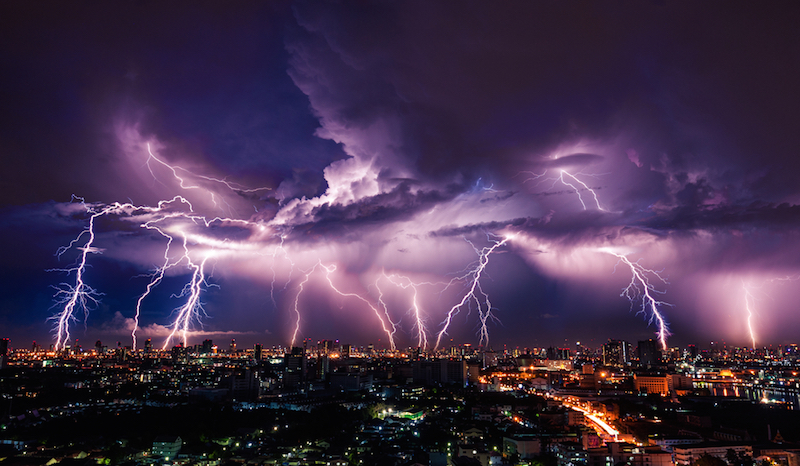Lightning Nearly 3 Times as Deadly as Tornadoes This Year

Get the world’s most fascinating discoveries delivered straight to your inbox.
You are now subscribed
Your newsletter sign-up was successful
Want to add more newsletters?

Delivered Daily
Daily Newsletter
Sign up for the latest discoveries, groundbreaking research and fascinating breakthroughs that impact you and the wider world direct to your inbox.

Once a week
Life's Little Mysteries
Feed your curiosity with an exclusive mystery every week, solved with science and delivered direct to your inbox before it's seen anywhere else.

Once a week
How It Works
Sign up to our free science & technology newsletter for your weekly fix of fascinating articles, quick quizzes, amazing images, and more

Delivered daily
Space.com Newsletter
Breaking space news, the latest updates on rocket launches, skywatching events and more!

Once a month
Watch This Space
Sign up to our monthly entertainment newsletter to keep up with all our coverage of the latest sci-fi and space movies, tv shows, games and books.

Once a week
Night Sky This Week
Discover this week's must-see night sky events, moon phases, and stunning astrophotos. Sign up for our skywatching newsletter and explore the universe with us!
Join the club
Get full access to premium articles, exclusive features and a growing list of member rewards.
Death by lightning strike may seem rare, but lightning has killed nearly three times as many people this year as tornadoes have, the National Weather Service (NWS) reports.
As of today (Sept. 12), 35 people have died from lightning strikes in the United States this year, the NWS said. In contrast, 12 people have died from tornadoes in 2016, the NWS reported.
"This year does seem to be unusually high," said John Jensenius, a lightning safety specialist with the National Weather Service in Gray, Maine. "That's because the totals for the years have been in the 20s for quite a number of years now, since 2009." [Images of Lightning Unfolding, Frame by Frame]
Partly to blame may be lack of awareness about lightning's dangers and, as such, people's riskier behaviors during such storms, Jensenius said.
From 2010 to 2015, there were between 23 and 29 lightning-related deaths per year in the country. In 2009, that number reached 34, Jensenius said.
Coincidentally, 2009 is also the last year that lightning deaths surpassed annual deaths from tornadoes, which led to 21 fatalities that year.
Tornado-related casualties vary widely depending on whether tornadoes hit populated areas. For instance, there were between 36 and 70 tornado deaths between 2012 and 2015, but 553 deaths in 2011, when a tornado struck populated Joplin, Missouri, and a so-called "super-outbreak" of tornados hit the South, Midwest and Northeast, Live Science reported. In fact, 2011 was the deadliest year for tornado deaths in the country, according to NWS records dating back to 1940.
Get the world’s most fascinating discoveries delivered straight to your inbox.
When lightning strikes
To stay safe during lightning storms, head indoors or to a hard-topped vehicle, Jensenius said. That's because lightning can leave victims dead or with lifelong disabilities, he said.
"When you're struck, you have electricity moving either over or through your body," Jensenius told Live Science. "The electricity typically goes through either the cardiovascular and/or the nervous system."
Lightning can stop a person's heart, sending the victim into cardiac arrest, something that could lead to death if CPR or another treatment isnꞌt administered, Jensenius said.
A lightning strike can also fry the nervous system, which usually sends small electrical impulses throughout the body to control the muscles.
"For people who survive, one of the problems they have is with memory," Jensenius said. "Oftentimes, they have trouble remembering old things, or storing new information and then recalling that information."
Lightning strikes can also cause burns all over the body, Jensenius said.
In addition, a person doesn't have to be directly struck by lightning to feel its stunning impact. It can strike an object near them, the ground they're standing on, or even travel through an electrical wire, including corded phones, the NWS said.
Original article on Live Science.

Laura is the managing editor at Live Science. She also runs the archaeology section and the Life's Little Mysteries series. Her work has appeared in The New York Times, Scholastic, Popular Science and Spectrum, a site on autism research. She has won multiple awards from the Society of Professional Journalists and the Washington Newspaper Publishers Association for her reporting at a weekly newspaper near Seattle. Laura holds a bachelor's degree in English literature and psychology from Washington University in St. Louis and a master's degree in science writing from NYU.
 Live Science Plus
Live Science Plus










